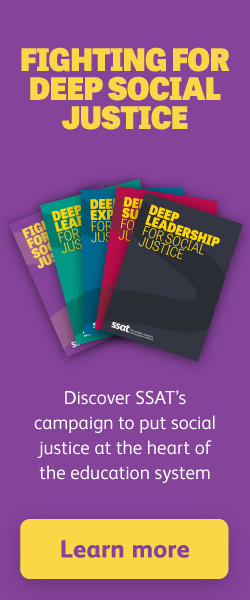
Sue Williamson, CEO at SSAT reflects on the government’s announcement to level up across the poorest parts of the country to close the disadvantage gap.
On 2 February 2022, the Levelling Up Secretary Michael Gove announced the government’s strategy to close the gap between rich and poor parts of the country. The strategy will take until 2030 and aims to improve services such as education, broadband and transport. Mr Gove said it would “shift both money and power into the hands of working people”. The strategy was not aimed at providing new funding but ensuring it is spent effectively on local priorities.
There are 12 levelling up missions, including eliminating illiteracy and innumeracy in primary school leavers by refocusing education spending on the most disadvantaged parts of the country. 55 Education Investment Areas (EIAs) will be designated in local authorities in England where school outcomes are currently weakest. The worst-off schools of the North, Midlands, Southwest, and East of England will receive the most support. The Department for Education (DfE) will offer retention payments to schools in these areas to ensure that they can retain the best teachers. These areas will also be prioritised for new specialist sixth form free schools that will provide high quality education for talented children from disadvantaged backgrounds. A new National Youth Guarantee is to be launched so that by 2025 every young person in England will have access to regular out of school activities.
Whilst SSAT welcomes any initiative that closes the gap between the rich and the poor, our concern is that there seems little new money and that the strategy will not help children who are in school now. The UK is one of the world’s most geographically unequal major economies. The strategy is ambitious but without the investment is it realistic? The cost of reunification of East and West Germany cost two trillion euros. What about the children in other areas of the country that are living in poverty. We recommend you read the Joseph Roundtree Foundation’s report from the Grassroots Poverty Action Group.
The report states:
“Broadly speaking, there seems little prospect of reversing the trends since around 2012/13 of rising child poverty (which rose by four percentage points to almost a third of children by 2019/20) and rising pensioner poverty (which has risen by five percentage points to almost a fifth of pensioners by 2019/20). Larger families and single-parent families have particularly high poverty rates at almost half for both single-parent families and for families containing three or more children. We are likely to see individuals in Bangladeshi, Pakistani and Black families continuing to have higher poverty rates (over 40% for individuals in households headed by someone of each of these ethnicities) and worse outcomes across many areas.
Most worryingly, our latest data showed a big rise in destitution with more than a million households (containing 2.4 million people, including 550,000 children) experiencing destitution in 2019, a rise of 35% since 2017, with modelling suggesting further increases during the pandemic. Another worrying element of the pandemic is how it is likely to have increased existing educational inequalities. We also know that the Covid-19 pandemic has widened the attainment gap between most and least disadvantaged pupils in the UK. This is due to a range of factors including the digital divide, home learning environments and potentially deepening poverty over the pandemic”.
Schools will have a major role to play, and we believe that the DfE and the government generally need to listen to school leaders on the best way forward. With limited resources, we need agencies to come together now to provide the support that young people need now. There needs to be more thought given to students with SEND, and we will be looking at this in depth in a future blog. We know early intervention is critical for all needs. We will be working with schools to secure deep social justice for all children and young people. We know it is a huge challenge, but we must do what is right for children and young people – they all deserve to leave school fully prepared to lead fulfilled and purposeful lives.

